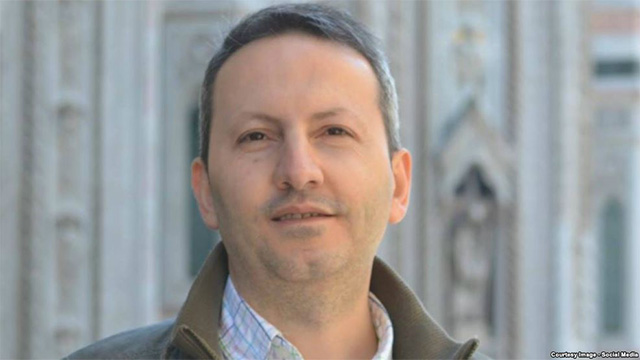
by Armin Baldwin
Ahmadreza Jalali, a Swedish-Iranian scholar, was told he would be sentenced to death in Iran last year. Jalali is a researcher at the Karolinska Institute in Stockholm. Although he has Iranian citizenship, he is a permanent resident of Sweden.
He was arrested in Iran in April 2016 while on official business on the charge of “enmity with God” and espionage.
The “enmity with God” charge is one that Iranian authorities frequently cite. The authorities view it as a crime that can be punished with the death penalty. His request to appeal was rejected by officials.
Jalali was attending a conference related to his work when he was arrested. His research work involves improving the process of emergency responses to terrorist attacks and biological, radiological and chemical threats at hospitals.
A few months after his arrest, Abbas Jafari Dolatabadi, the Tehran prosecutor, said that Jalali was providing Israel with intelligence regarding Iran. “The person had several meetings with Mossad [an Israeli intelligence agency] and provided them with sensitive information about Iran’s military and nuclear sites in return for money and residency in Sweden.”
Amnesty International slammed Iran for its disregard to due process. Its Middle East and North Africa Research and Advocacy Director, Philip Luther, said: “Ahmadreza Jalali was sentenced to death after a grossly unfair trial that once again exposes not only the Iranian authorities’ steadfast commitment to use of the death penalty but their utter contempt for the rule of law.
At a time when the Iranian authorities are actively strengthening ties with countries in the European Union, it is absurd that they are using Ahmadreza Jalali’s academic links to a European country as part of the ‘evidence’ against him.”
Mahmoud Sadeghi, an Iranian MP, has admitted that Jalali was not given the opportunity during his trial to defend himself.
The MP said in a message on Twitter on 14th February that Jalali was not given the time to respond to the charges at various stages of the trial. He also said that Jalali was put under pressure to confess and he was forced to make a statement on national television saying that he had spied for Israel.
The death sentence was handed out in October 2017 by the notorious judge Abolqassem Salavati’s Iranian Revolutionary Court.
Jalali has said that all of the accusations against him are false and said he believes that he is in jail because he refused to spy for Iran.
Numerous organisations have asked Iranian authorities to review the case and to rescind the death sentence, including the United Nations, Amnesty International and the Swedish foreign ministry.
The Foreign Minister of Sweden, Margot Wallstrom, condemned the sentencing and said that Iranian representatives in Iran and Stockholm have been consulted. She said: “We condemn the use of the death penalty in all its forms. The death penalty is an inhuman, cruel, and irreversible punishment that has no place in modern law.”
Dual-nationals have been particularly targeted by Iranian authorities.







